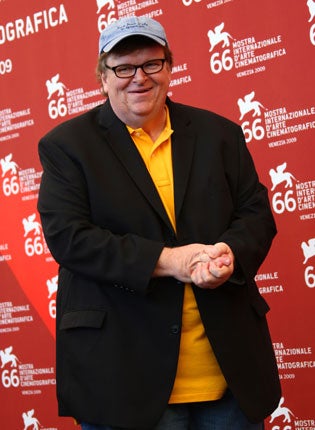First Night, Capitalism: A Love Story, Venice Film Festival
One from the heart, with humour amid the hectoring

Michael Moore's brand of populist polemics had more of a sense of burning urgency during the Bush era than it does now. His new film tub-thumps against the evils of corporate capitalism in America. It's a message we've all heard before in the wake of the economic collapse, the sub-prime mortgage crisis and the bank bailouts.
However, he delivers it in such rousing and entertaining fashion that he carries us with him. This may be a documentary but it has the same uplifting, folksy feel as old Frank Capra movies of the 1930s in which an American everyman (James Stewart or Gary Cooper) would take on the big, bad world of Washington or Wall Street.
The film opens by comparing the contemporary US to the Roman Empire in its terminal days of decline. Reality TV and wrestling, Moore argues, are the new equivalent to the "bread and circuses" during the time of the Caesars.
Capitalism: A Love Story isn't really about American decline, though. It's about renewal too. Moore makes fiery attacks on "condo vultures" (property speculators preying on home owners who lose their houses), Goldman Sachs bankers (who seemingly still hold the levers of American power) and deregulators from the Reagan era. We hear shocking stories about how poorly airline pilots are paid and how this puts passengers' safety at risk. Moore rails against bankers who have tried to turn his beloved America into "a plutonomy," a society in which the 1 per cent of the very, very rich lord it over the rest of the population. He bemoans the bank bailouts as a corporate coup d'etat and tries to work out where all the taxpayer money has gone. We hear the shocking story of the privatised juvenile detention centre whose owners made fortunes locking up youngsters on minor misdemeanours.
This is all familiar stuff. Moore delivers his arguments in his usual scattergun fashion, mixing archive footage, interviews, sarcastic voice-overs and his own interventions. (He spends a lot of time on Wall Street trying to make citizen's arrests of bankers.) When you unpick the rousing rhetoric you quickly realise that contradictions and syllogisms abound. Coherence isn't his strong point. Even so, this is moving and entertaining fare.
Alongside the attacks on the capitalist fat cats, Moore celebrates Americans who've fought back: workers who stage sit-ins, local residents who stop foreclosures, priests and economic gurus who speak out against the evils of capitalism. There's no mention of Marx. Instead, Moore extols a version of American democracy embodied by Presidents like Roosevelt and Carter who had a basic sense of decency and fair play. The director sometimes seems naïve and sentimental. Nonetheless, he makes it clear throughout that this is his own story as much as it is that of his troubled country. We see home movie footage of Moore, enjoying what seemed to be a halcyon, all-American childhood – a time of near full employment when workers were treated decently and the old, pre-Reagan social contract was still in place. We then see the filmmaker and his dad visiting the ruins of the old factory where Moore Sr used to work.
"When I was young, I wanted to be a priest," the filmmaker declares at one stage. In a sense, that is what he has become, with film as his pulpit. At his worst, he can be a hectoring and overbearing figure. Here, though, there is humour and pathos in his sermonising. He is an entertainer as well as a would-be prophet.
Subscribe to Independent Premium to bookmark this article
Want to bookmark your favourite articles and stories to read or reference later? Start your Independent Premium subscription today.

Join our commenting forum
Join thought-provoking conversations, follow other Independent readers and see their replies